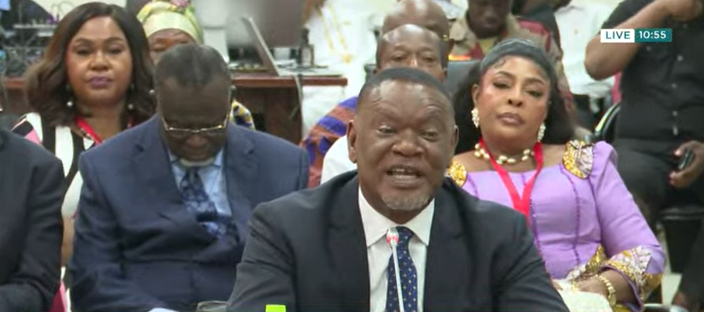Justice Senyo Dzamefe’s unwavering affirmation of presidential term limits during his parliamentary vetting has injected a potent dose of reassurance into Ghana’s political landscape, particularly amidst the swirling controversy surrounding President John Dramani Mahama’s recent Supreme Court nominations. Dzamefe’s unequivocal support for Article 66(2) of the 1992 Constitution, which restricts presidents to two terms, serves as a critical affirmation of the rule of law and the sanctity of constitutional provisions, especially in the face of accusations leveled by the opposition. His clear and concise response, emphasizing the unambiguous language of the constitution, effectively shuts down any potential for misinterpretation or circumvention of this crucial democratic safeguard. This stance carries significant weight given the timing, as it directly addresses the simmering allegations of a clandestine third-term agenda being pursued by the ruling National Democratic Congress (NDC).
The political atmosphere in Ghana has been charged with suspicion and speculation since Minority Leader Alexander Afenyo-Markin publicly accused President Mahama and the NDC of plotting to extend the president’s time in office beyond the constitutionally mandated two terms. Afenyo-Markin’s claim, made in a May 1, 2025 interview, linked the president’s nomination of seven new Supreme Court justices to this alleged scheme. He portrayed the nominations as a strategic maneuver to pack the court with sympathetic judges who would potentially support a legal challenge to the term limits provision. This accusation, framed as a calculated move by NDC “hawks,” sparked widespread debate and fueled anxieties about the potential erosion of democratic norms within the country.
The government, however, has vehemently denied these allegations, defending the Supreme Court nominations as a necessary step to bolster the judiciary’s capacity to handle increasingly complex legal matters. President Mahama, exercising his constitutional prerogative under Article 144(2), appointed the seven justices from the Court of Appeal on April 30, 2025. Government officials maintain that this move is aimed at strengthening the apex court’s ability to adjudicate complex constitutional and legal issues, and is not part of any hidden political agenda. They argue that a robust and well-staffed Supreme Court is essential for upholding the rule of law and ensuring the smooth functioning of the justice system, particularly in the face of growing legal and constitutional challenges.
Justice Dzamefe’s firm commitment to constitutionalism, expressed during his appearance before the Appointments Committee, takes on added significance against this backdrop of political tension and accusations. His unambiguous support for presidential term limits provides a vital counterpoint to the narrative of a power grab being advanced by the opposition. By aligning himself with the clear language of the constitution, Dzamefe reinforces public trust in the judiciary’s independence and impartiality, particularly in the context of the recent appointments. This stance serves as a crucial signal that the newly appointed justices, including Dzamefe himself, are not beholden to any political agenda and are committed to upholding the constitution without fear or favor.
The controversy surrounding the Supreme Court nominations highlights the increasing scrutiny faced by judicial appointments in Ghana’s current political climate. The opposition’s accusations, while unproven, have nevertheless injected an element of distrust into the process. The public is increasingly sensitive to any perceived attempts to politicize the judiciary, and the debate over the nominations underscores the importance of transparency and adherence to constitutional principles in judicial appointments. Justice Dzamefe’s public commitment to term limits can be seen as an effort to reassure the public that the judiciary remains independent and committed to upholding the rule of law, regardless of political pressures.
In conclusion, Justice Dzamefe’s unwavering support for presidential term limits serves as a powerful affirmation of constitutionalism and the rule of law in Ghana. His clear stance, delivered at a time of heightened political tension and accusations of a third-term agenda, carries significant weight and helps to dispel concerns about the independence of the recently appointed Supreme Court justices. By unequivocally upholding the constitution’s clear language on term limits, Dzamefe reinforces public trust in the judiciary and provides a much-needed voice of reason amidst the ongoing political debate. This commitment to constitutional principles serves as a vital bulwark against any potential erosion of democratic norms and reinforces the importance of an independent and impartial judiciary in upholding the rule of law. It also serves as a reminder that the constitution, and its clear provisions, must remain the supreme guide for all political actors, regardless of party affiliation or political ambition.


